
ACTA PARASITOLOGICA
Scope & Guideline
Bridging Knowledge Gaps in Parasitology
Introduction
Aims and Scopes
- Infection Dynamics and Epidemiology:
Research on the prevalence, transmission, and risk factors associated with parasitic infections across different geographic regions and host species. - Molecular and Genetic Characterization:
Studies utilizing molecular techniques for the identification and characterization of parasites, including genetic diversity and phylogenetic analyses. - Novel Therapeutic Approaches:
Exploration of new treatments for parasitic infections, including the efficacy of traditional medicinal plants and innovative pharmaceutical compounds. - Ecological and Environmental Impact:
Investigation into how environmental factors affect the distribution and lifecycle of parasites, as well as their interactions with hosts. - Clinical and Pathological Studies:
Research focusing on the clinical manifestations of parasitic infections, their impact on host health, and associated pathological changes. - Vector Biology and Control:
Studies on the vectors of parasitic diseases, including their biology, ecology, and strategies for control and prevention.
Trending and Emerging
- Molecular Epidemiology:
An increase in studies using molecular techniques to understand the epidemiology of parasitic diseases, aiding in the development of targeted interventions. - Antiparasitic Drug Resistance:
Research addressing the growing concern of drug resistance among parasites, particularly in the context of malaria and leishmaniasis. - Microbiome Interactions:
Emerging studies exploring the interactions between host microbiomes and parasitic infections, highlighting the complex relationships affecting disease outcomes. - Climate Change Effects:
Research focused on the impact of climate change on parasite distribution and lifecycle, emphasizing the need for adaptive strategies in public health. - Immunological Responses to Parasites:
An increasing number of studies investigating host immune responses to parasitic infections, which may lead to novel therapeutic strategies. - Nanotechnology in Treatment:
The application of nanotechnology for the development of new therapeutic agents against parasites, representing a cutting-edge area of research.
Declining or Waning
- Traditional Helminthology:
Research on traditional helminths, particularly those affecting livestock, has decreased as newer methodologies and topics, such as molecular studies and zoonotic parasites, gain more attention. - Invasive Alien Species Impact:
The focus on the ecological impacts of invasive parasitic species has waned, possibly due to a shift towards understanding the implications of climate change and habitat alteration. - Single-Host Studies:
Research that focuses solely on single-host parasite interactions has declined, as there is a growing emphasis on multi-host and ecological dynamics involving multiple species. - Historical Parasitology:
Studies focused on historical records and the evolution of parasites are less frequent, indicating a shift towards contemporary and applied parasitology.
Similar Journals
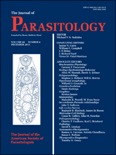
JOURNAL OF PARASITOLOGY
Innovative Research at the Intersection of Ecology and MedicineJOURNAL OF PARASITOLOGY is a leading scholarly publication dedicated to the field of parasitology, published by ALLEN PRESS INC. With an impactful history spanning from 1945 to 2024, this journal serves as a vital resource for researchers, professionals, and students interested in the complex interactions between parasites and their hosts. Operating from its base in the United States, this journal holds a Scopus quartile ranking of Q3 in Ecology, Evolution, Behavior and Systematics, Medicine (Miscellaneous), and Parasitology, providing a solid reflection of its impact within these categories. While currently not offering Open Access, the JOURNAL OF PARASITOLOGY continues to encourage the dissemination of pivotal research findings that contribute to our understanding of parasitic diseases and ecological systems, positioning it as an indispensable tool for knowledge advancement in the life sciences.
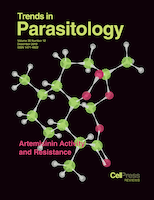
TRENDS IN PARASITOLOGY
Advancing the frontiers of parasitology research.TRENDS IN PARASITOLOGY is a premier academic journal published by CELL PRESS, focusing on the dynamic field of parasitology and infectious diseases. With an ISSN of 1471-4922, this esteemed journal is recognized for its high impact within the research community, boasting a Q1 ranking in both the Infectious Diseases and Parasitology categories as of 2023. This places it among the top-tier journals in the field, as evidenced by its remarkable Scopus rankings, where it ranks #3 out of 79 in Parasitology and #29 out of 344 in Infectious Diseases. Spanning over two decades of scholarly contributions from 2001 to 2024, TRENDS IN PARASITOLOGY emphasizes the latest advancements, challenges, and innovative methodologies in parasitology, making it an invaluable resource for researchers, healthcare professionals, and students alike. With an increasing focus on open access initiatives, this journal not only promotes widespread dissemination of knowledge but also encourages collaboration across the global scientific community. Whether you are investigating novel interventions, exploring parasite evolution, or understanding host-pathogen interactions, TRENDS IN PARASITOLOGY remains at the forefront of research, driving forward the understanding of parasitic diseases.

Parasitologists United Journal
Exploring the Impact of Parasites on HealthParasitologists United Journal is a premier academic outlet dedicated to advancing the field of parasitology. Published by the Egyptian Parasitologists United Society (EPU), this journal serves as a critical platform for researchers, professionals, and students alike, allowing them to share innovative findings and developments in the study of parasites and their impacts on human, animal, and environmental health. With an ISSN of 1687-7942 and an E-ISSN of 2090-2646, it aims to promote knowledge dissemination while fostering collaboration across borders. Although currently not an Open Access journal, its commitment to high-quality, peer-reviewed content ensures that the latest research reaches discerning readers. By featuring a diverse array of articles spanning various aspects of parasitology, the journal significantly contributes to the global understanding of parasitic diseases and their management, making it an essential resource for academic and clinical professionals seeking to enhance their expertise in this vital area of health science.

KOREAN JOURNAL OF PARASITOLOGY
Connecting Researchers in the Fight Against ParasitesKorean Journal of Parasitology is a respected publication in the field of parasitology, originating from the esteemed Korean Society of Parasitology and affiliated with Seoul National University College of Medicine. Established in 1977, this journal focuses on disseminating significant research findings related to parasitic diseases, their vectors, and control measures, serving as a vital resource for researchers, medical professionals, and students alike. Although coverage in Scopus has been discontinued as of 2022, the journal remains a valuable platform for in-depth studies within the areas of Infectious Diseases and Immunology. With an ISSN of 0023-4001 and an E-ISSN of 1738-0006, the journal promotes open access to enhance academic sharing. Despite its current Scopus rankings, which place it in the 38th percentile for Infectious Diseases and 37th percentile for Immunology and Microbiology (Parasitology), it continues to contribute to the global discourse on parasitological research, encouraging collaboration and emphasizing the importance of this field in public health.
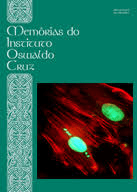
MEMORIAS DO INSTITUTO OSWALDO CRUZ
Pioneering Insights for Global Health Challenges.MEMORIAS DO INSTITUTO OSWALDO CRUZ, published by the esteemed FUNDACO OSWALDO CRUZ in Brazil, serves as a vital platform for the dissemination of research in the fields of medicine and microbiology. With its inception dating back to 1909 as an open-access journal, it has made significant strides in promoting the understanding of health-related topics and infectious diseases across its diverse readership. This journal is recognized for its contribution to the scholarly community, boasting a Q2 category in Medicine (miscellaneous) and a Q3 rating in Microbiology (medical) as per the 2023 quartiles. Located in Rio de Janeiro, the journal not only embraces a rich historical context but also engages with contemporary issues in public health. Researchers and professionals in related fields will find valuable insights and data that underscore the significance of scientific collaboration in tackling global health challenges. With access to its archives spanning multiple decades, MEMORIAS DO INSTITUTO OSWALDO CRUZ remains a key resource for students and researchers alike as they endeavor to expand their knowledge and contribute to future innovations in health science.

Current Research in Parasitology & Vector-Borne Diseases
Exploring the frontiers of parasitology for global health.Current Research in Parasitology & Vector-Borne Diseases, published by ELSEVIER, is an influential journal dedicated to advancing the understanding of parasitology and vector-borne diseases. With an ISSN of 2667-114X, this journal is highly esteemed in the field, holding a prestigious Q1 quartile ranking in categories such as Animal Science and Zoology, Insect Science, and Parasitology, as well as a notable Q2 ranking in Virology for 2023. The journal's focus spans a crucial intersection of disciplines, offering a platform for innovative research that directly addresses global health challenges posed by parasites and vectors. Researchers benefit from its robust open-access model, which facilitates unrestricted dissemination of knowledge, making essential findings accessible to a wider audience. The journal continues to play a pivotal role in fostering scholarly dialogue and interdisciplinary collaboration within the scientific community, serving as a vital resource for professionals, students, and academicians interested in the dynamic and evolving field of parasitology.
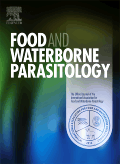
Food and Waterborne Parasitology
Unveiling the Impact of Parasites on Public HealthFood and Waterborne Parasitology is a premier open-access journal published by ELSEVIER, dedicated to the critical study of parasites affecting food and water safety. Since its inception in 2015, the journal has significantly contributed to research in the fields of epidemiology, food science, and parasitology, achieving impressive rankings in its categories with a Q1 status in Food Science and a Q2 in both Epidemiology and Parasitology as of 2023. Addressed from RADARWEG 29, 1043 NX Amsterdam, Netherlands, it garners attention for its accessible content, aiming to elevate the understanding of the impact of parasitic organisms on public health and food security. With its open-access model, the journal enhances visibility and dissemination of research findings, fostering collaboration and innovation among researchers, professionals, and students alike. By bridging scientific inquiry with practical applications, Food and Waterborne Parasitology plays a pivotal role in addressing global health challenges and advancing knowledge in this vital area of study.

Therapeutic Advances in Infectious Disease
Pioneering progress in infectious disease pharmacology.Therapeutic Advances in Infectious Disease is a distinguished journal published by SAGE Publications Ltd, dedicated to advancing knowledge in the vital field of infectious diseases and pharmacology. With an impactful Open Access model since 2019, the journal facilitates unrestricted access to a wealth of high-quality research, enabling researchers, clinicians, and educators to stay at the forefront of infectious disease management and treatment. As a recognition of its contribution to the scientific community, the journal holds a prestigious Q1 quartile ranking in both Infectious Diseases and Medical Pharmacology as of 2023, underscoring its influence and relevance in these domains. The journal is positioned favorably within the Scopus rankings, with an impressive standing in the diverse categories of Medicine, emphasizing its commitment to disseminating innovative research. Through a rigorous peer-review process and a broad scope that covers therapeutic advancements, Therapeutic Advances in Infectious Disease serves as an essential resource for anyone involved in combating infectious diseases, offering insights that drive clinical applications and enhance patient care.
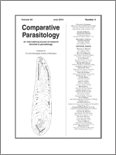
Comparative Parasitology
Innovating Research on Parasitism and EcosystemsComparative Parasitology, published by the Helminthological Society of Washington, serves as a vital platform for the dissemination of innovative research in the fields of parasitology, ecology, and evolution. With an ISSN of 1525-2647 and an E-ISSN of 1938-2952, this journal has charted a course of academic influence since its inception in 1996, and is set to continue until 2024. Although it currently holds a Q4 ranking in both Ecology, Evolution, Behavior and Systematics and Parasitology categories, it guarantees significant contributions and diverse studies, providing an essential resource for researchers and practitioners in these domains. Located in the United States and managed by Allen Press Inc, Comparative Parasitology emphasizes open access, ensuring that vital research findings are readily available to the global community. The journal remains dedicated to fostering an understanding of the complexities of host-parasite interactions and promoting interdisciplinary collaboration, making it a crucial resource for students and professionals alike.

PARASITOLOGY RESEARCH
Unveiling the complexities of parasitic life.PARASITOLOGY RESEARCH, published by Springer, stands as a pivotal journal in the fields of parasitology, infectious diseases, and insect science, with a rich history dating back to 1987. Operating from Germany, this journal has garnered an impressive reputation, achieving a high ranking within various categories, including Q1 in Veterinary (miscellaneous) and Q2 across several relevant fields as of 2023. While it does not currently offer Open Access options, the journal remains a vital resource for researchers, professionals, and students seeking to contribute to and keep pace with advancements in parasitological studies. With a commitment to publishing high-quality research, PARASITOLOGY RESEARCH serves as an essential forum for disseminating findings that enhance our understanding of parasitic organisms and their impacts on health and the environment. Explore this journal to engage with cutting-edge investigations and reviews that drive innovation in parasitology and related disciplines.